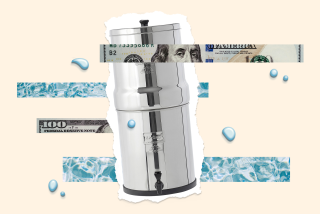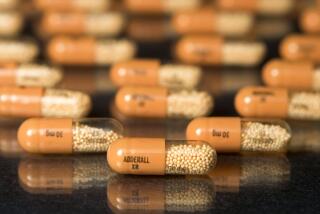Sudafed Maker Again on Defensive
- Share via
Each day this week, at 8 a.m. and at 5 p.m., a group of 12 Burroughs Wellcome senior executives have met with one overriding mission: to save Sudafed’s good name.
It won’t be easy. In recent weeks, two people in Washington state have died and another was seriously injured after taking tainted Sudafed capsules containing cyanide. On March 3, the company ordered a nationwide recall of the decongestant. The U.S. Food & Drug Administration soon followed with its own recall order.
On Thursday, a day after the widow of a poisoning victim filed suit against Burroughs Wellcome, the company offered a $100,000 reward for information leading to the conviction of whoever is tampering with the capsules.
Seldom does top-notch public relations play a more crucial role than now. Far more people recognize the name Sudafed than that of the company that makes it. It is Burroughs Wellcome’s third-best-selling product line.
Public controversy is not new to Burroughs Wellcome. Last year, it faced intense public criticism over what some contended was an excessive price--originally almost $10,000 a year for patients on a full dose--that it charged for the anti-AIDS drug AZT. Some criticized its response to that public relations flap. And once again, the company is getting mixed reviews on how it is handling its latest PR crisis.
“Normally in a crisis, you try to isolate the problem, solve it and get it out of the news,” said Robert L. Dilenschneider, president and chief executive of the nation’s largest public relations firm, New York-based Hill & Knowlton. “With skillful management, that would have happened. But they can’t seem to get the story to go away.”
Yet another expert criticizes the company for failing to take a leadership position early on--and also for not publicly showing more genuine emotional concern.
“In any kind of product tampering, the company is really a victim, so it must turn around and take a leadership role,” said Lynne Doll, executive vice president of Roger & Associates, a Los Angeles public relations firm that handles crisis management for several clients. “But it seems to me that they have let the Food and Drug Administration take the lead on this.”
Also, said Doll, “I still haven’t seen an emotional response from the company’s chief executive saying how sorry he is. I don’t mean he should be crying on TV. But you can’t just repond with facts. You need to respond to the consumer as an emotionally caring company.”
Meanwhile, several public relations experts were outspoken Thursday in praising Burroughs Wellcome. Among them is Lawrence G. Foster, public relations point man at Johnson & Johnson during the Tylenol episode a decade ago.
“From everything I’ve seen, the company has acted promptly and positively,” said Foster, who is now a consultant in Westfield, N.J.
Likewise, Harold Burson, chairman of the New York public relations giant Burson-Marsteller, said he is impressed with Burroughs Wellcome’s reaction. “I’m a total outsider on this, but from what I’ve seen, I’d give them good marks,” he said.
At Thursday’s press conference, Philip R. Tracy, president of Burroughs Wellcome, may not have been emotional, but he did show concern. Among other things, Tracy mentioned that he personally sent notes to the spouses of the poisoning victims.
And he strongly denied that cost was a factor in any of the company’s decisions. “We didn’t even talk about costs when we made our decisions,” he said. He noted that the recall will cost “tens of millions” of dollars.
The 1982 Tylenol drug tampering episode cost its maker, Johnson & Johnson, an estimated $125 million in lost sales.
But the most painful--if less expensive--costs could come not in the marketplace but in the courtroom. Settlements in wrongful death cases, such as in the aftermath of airplane crashes, have run into seven figures. But product liability attorneys said Thursday that the product’s “tamper-evident” packaging would provide a good defense for the company.
In the aftermath of the Tylenol tragedy, new standards were set for packaging safety. But this case will show that “capsules are inherently dangerous. I think this event is going to result in FDA (prohibitions on) selling capsules over the counter,” said Paul Whalen, the lawyer for the widow of one victim.
Researcher Doug Conner in Seattle contributed to this story.
WELLCOME PLC Headquarters: London
Worldwide drug sales: $1.9 billion
Worldwide employees: 18,800
Subsidiary: Burroughs Wellcome Co., Research Triangle Park, N.C.
U.S. sales: $700-$750 million*
Employees: 4,330
Makes the prescription, anti-AIDS drug AZT. Other products include Actifed, Sudafed and Nix (for parasite infestations).
Source: Standard and Poors
*estimate by Mehta & Isaly pharmaceuticals research.
More to Read
Inside the business of entertainment
The Wide Shot brings you news, analysis and insights on everything from streaming wars to production — and what it all means for the future.
You may occasionally receive promotional content from the Los Angeles Times.










